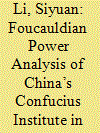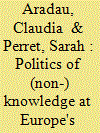|
|
|
Sort Order |
|
|
|
Items / Page
|
|
|
|
|
|
|
| Srl | Item |
| 1 |
ID:
193034


|
|
|
|
|
| Summary/Abstract |
The Confucius Institute (CI) was established in 2004 by China to disseminate its language, culture and other forms of positive knowledge to people of different nationalities. By critiquing existing analytical frameworks of the CI, this article draws on Foucault’s conception of power, which explains the role of language, culture, value and other non-material elements in the operation of power, to examine the case study of the CI in Africa. By investigating the CI’s power structure, its internal power operations and its power effects, this research seeks to ascertain the role of the CI in the institutionalisation of China’s foreign policy towards Africa.
|
|
|
|
|
|
|
|
|
|
|
|
|
|
|
|
| 2 |
ID:
185784


|
|
|
|
|
| Summary/Abstract |
From statistical calculations to psychological knowledge, from profiling to scenario planning, and from biometric data to predictive algorithms, International Relations scholars have shed light on the multiple forms of knowledge deployed in the governing of populations and their political effects. Recent scholarship in critical border and security studies has drawn attention to ‘the other side of knowledge’ and has developed a vibrant conversation with the emergent interdisciplinary field of ignorance studies. This article proposes to advance these conversations on governing through non-knowledge by nuancing the analysis of power/(non-)knowledge/subjectivity relations. Firstly, we expand the analysis of non-knowledge by attending to the problematisation of errors and fakes in controversies at Europe's borders. Errors have emerged in relation to border actors’ practices and technologies, while migrant practices, documentation, and narratives are deemed to be potentially ‘fake’, ‘fraudulent’, or ‘false’. Secondly, we explore how different subjectivities are produced through regimes of error/truth and fake/authenticity. We argue that there are important epistemic differences between ‘fake’ and ‘error’, that they are entangled with different techniques of power and produce highly differentiated subjectivities. Finally, we attend to how these subjectivities are enacted within racialised hierarchies and ask whether non-knowledge can be mobilised to challenge these hierarchies.
|
|
|
|
|
|
|
|
|
|
|
|
|
|
|
|
|
|
|
|
|